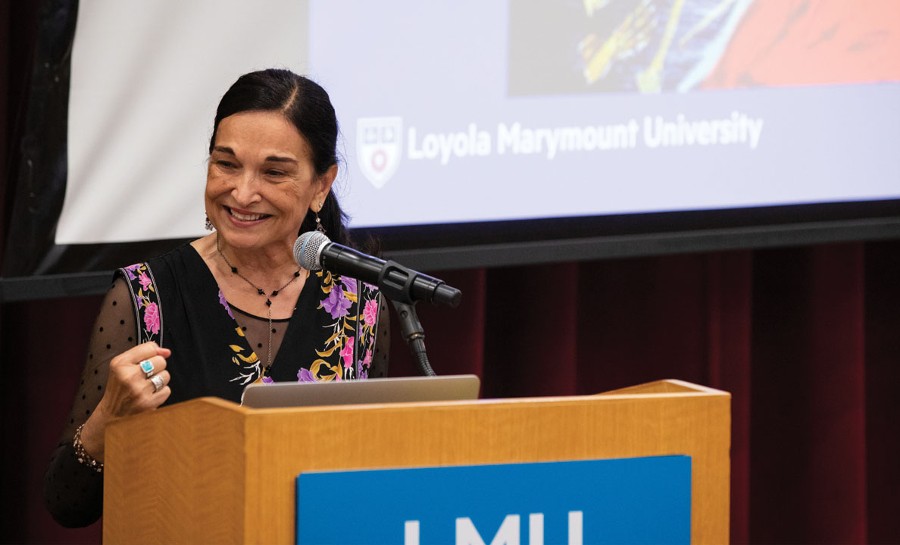
Scholar, teacher, activist Antonia Darder, Ed.D., reflected on the course of her 40-year career in education “to live meaningful, creative lives” during a passionate lecture tinged with humor, before a loving and admiring crowd, and touching on real-life examples of her subject, which is always making life better for those who suffer.
Darder told the nearly 200 faculty, staff, alumni, and students at Hilton Center for Business, as well as those viewing online, “Only through our willingness to step courageously into vulnerability, compassion, perseverance, intimacy, coherence, integrity, and commitment to community – that allows us to remain true to one another and to this political project of love.”
Enunciating the principles to which she has devoted her career, Darder delivered the eighth annual Leavey Presidential Chair Lecture, “Fighting the Good Fight: Reflections on Politics, Pedagogy, and Struggle,” on April 4, 2022, in advance of her retirement from the LMU School of Education, where she has guided and nurtured doctoral candidates since 2011.
Darder, professor of education leadership and the Leavey Presidential Chair of Ethics and Moral Leadership, is an internationally recognized scholar in the works of Paulo Freire. She is also professor emerita of education policy, organization and leadership at the University of Illinois, Urbana Champaign.
She talked about the potential of community to “be able to fully step into the power of a creative force that is generated when our hearts, and our bodies, and our minds, and spirits commingle the essence of a just and more loving world.” Darder’s scholarship, as with her lecture, offered a detailed and comprehensive analysis of how economics, politics, and culture coalesce to create social and interpersonal relationships that can either crush or raise human spirits. But the prevailing values of acquisition, extraction, and colonization, she said, cause more suffering and strife than we have yet to admit.
Throughout her career, Darder’s practice and scholarship have focused on political questions and ethical concerns linked to racism, class inequalities, language rights, critical pedagogy, Latino education, and social justice. More recently, her work has sought to articulate a critical theory of leadership for social justice and community engagement, as well as to theorize a pedagogy of beauty, in the pursuit of a liberatory practice of education.
She closed her lecture with a deeply felt plea for commitment. “In fighting the good fight, we must recognize that we are not doomed to keep reliving the trauma of oppression … come to know our core, that another way of life is possible for our children and our grandchildren … to live meaningful, creative lives.”
“But I can affirm,” she told the rapt audience, “you know, with all these tears, all my crazy little self, after almost 70 years, that truly is an unbelievable and passionate way to live our lives, to love, to work, to dream and to awaken to unimaginable possibilities.”



